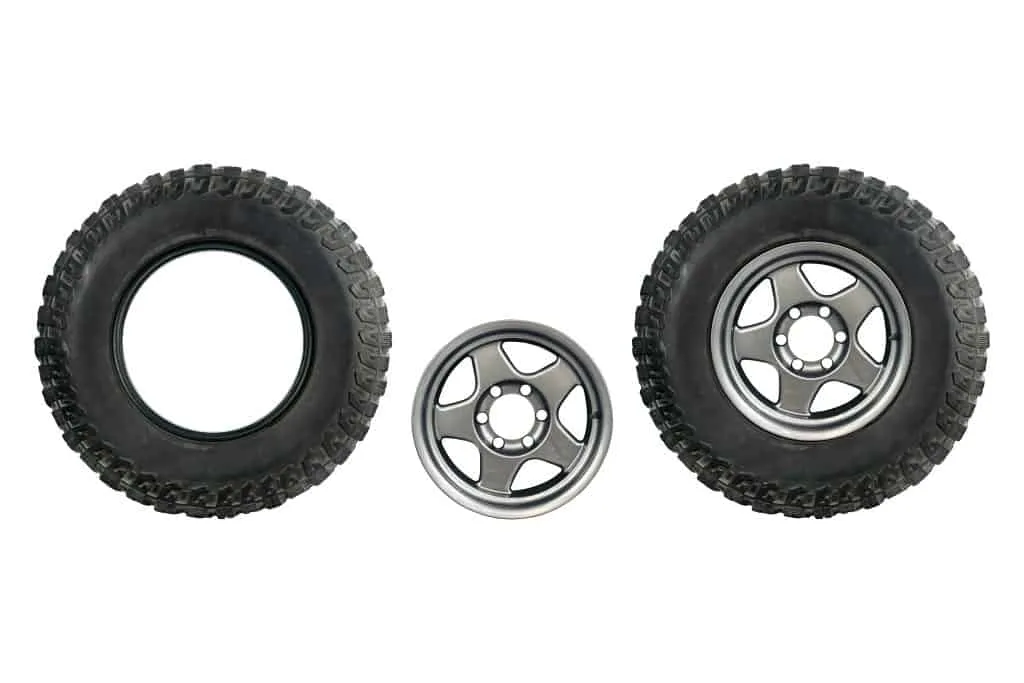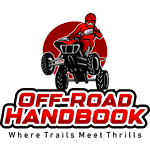As alloy wheels became increasingly popular in motorsport, their demand also steadily increased in the commercial market. Are alloy wheels good for off-roading?
Alloy wheels are good for off-roading since they are lighter than steel wheels, which means quicker acceleration and braking. The lighter the wheel, the easier the suspension to handle.Alloy wheels are better at dissipating heat away from brake components under extreme driving conditions.
Since they are often several pounds lighter per wheel than steel wheels, they ensure faster acceleration and braking. Alloy wheels are better at dissipating heat away from brake components under extreme driving conditions than steel wheels.
Top 9 Reasons Why Alloy Wheels are Good For Off-Roading:
You will have to pay a premium for alloy wheels now. However, they’re much lighter and accelerate much faster. Steel wheels are more durable. In addition, you have a wide range of styles to choose from. Different ways can be used to paint, polish, chrome, or machine them.
Below features make alloy wheel stand apart when compared to steel wheel:
1. A Better-Looking Alloy Wheel:
Steel wheels can never be compared to alloy wheels in terms of aesthetics and visual impact, and that is one of the main reasons car owners choose alloy wheels.
2. Enhanced Heat Conduction/Dissipation:
Alloy wheels dissipate heat more efficiently than steel wheels, providing better braking performance and lowering the risk of brake failure.
3. Improved Performance:
Alloy wheels reduce unsprung weight, which reduces the spring’s inertia, allowing the suspension to follow the road’s contours more closely, thus providing better traction.
Additionally, handling, steering, and cornering are markedly improved. Light-weight alloy wheels are easier to change on the track than heavy steel wheels, which makes a big difference when changing wheels when travelling alone.
4. The Fuel Economy is Improved:
It’s because alloy wheels are lighter than steel wheels. Due to the weight reduction compared to steel, it makes sense for vehicle manufacturers. With less rotational mass, less fuel is needed to turn the wheel, which most buyers are concerned about, not the material.
5. Better Braking:
There is better traction during braking since wheel hop is reduced with alloy wheels.
6. Less Likely to Corrode and Rust:
Alloy wheels provide better corrosion and rust protection since they are usually made of aluminium alloy.
7. Extends Tire Life:
Tires wear out less quickly because alloy wheels dissipate heat better.
8. A Good Fit for Tubeless Tires:
Steel wheels, which experience slight tire pressure losses, are incompatible with tubeless tires since they are completely airtight. On the other hand, Alloy wheels are the perfect foil for tubeless tires.
9. MPG is Better on Alloy Wheels:
Hard impacts do not go well with an alloy wheel. You have a greater chance of hitting a rock on the wheel when you start to air down the tires. A hard hit to an alloy can cause it to crack. If this happens, it is extremely difficult to fix a trail to hold air. Once you are home, you will need to replace the device.
Alloy Wheel Sizes:
Alloys are available in a greater range of sizes. They range in size from 15 inches to 22 or 24 inches. It's best to avoid wheels and tires bigger than 18 inches when off-roading. Since steel wheels are primarily intended for farmers, workers, and off-roaders, the only sizes available are 14 inches and 18 inches.
It is generally believed that alloy wheels provide better acceleration, braking, and suspension performance.

Specifications of an Aluminium/Alloy wheel:
| Type | Aluminum/Alloy Wheel |
|---|---|
| Choice of Spokes | A wide range of choices |
| Finish Options | Chrome, powder-coated, painted, machined, bare polished, PVD, painted, powder-coated, powder-coated |
| Finished Durability | Lightweight and somewhat impact-resistant. Wheels that are chrome-plated and bare polished are susceptible to scratching and oxidation. |
| Heat Resistant | It absorbs heat slower and can dissipate heat faster – keeping those brakes cool and your pants clean on a hot summer day. |
| Purpose-driven driving | Suitable for urban, rural, off-road, and mountainous terrain. Using performance tires Driving with a spirit of adventure Show and custom vehicles |
| Efficient use of fuel | Lighter wheels make it better |
| Considerations for Finish Care | When properly maintained, four seasons can be enjoyed. Where road deicing chemicals are used, chrome-plated and bare-polished wheels need frequent cleaning. |
| Expenses | Moderate to High |
| Pros | They exhibit high rigidity and resistance to mild impact forces Have a hard time being bent or distorted Edges that are sharp They won’t rust if they are scratched Can withstand low- to medium-impact forces Balance more easily Offer a variety of styles Sizes are available for most vehicle types Low heat conduction |
Alloy Wheels Vs Steel Wheels:
Buying alloy wheels is a good option if you want wheels with style and performance. Alloy wheels have a more appealing appearance than steel wheels, and they perform better.
Steel wheels are heavier than alloy wheels, which means they operate lower in most conditions. In a city, alloy wheels are a big advantage in fuel economy. Your car’s suspension will be less stressed due to the lighter frame of alloy wheels. Your car will also accelerate more quickly.
Alloy wheel Safety Precautions:
Here are a few basic precautions you should take when riding off-road on a bike equipped with alloy wheels.
1. Reduce Tire Pressure by 2-3 psi:
They are really easy to glide on the road because they are hard and have excess pressure. This is great if you are riding on the highway for speed and efficiency, but you want them to be softer when riding off-road.
Keeping the alloy wheels protected gives the tires a bit more flexibility to absorb bumps.
2. Give as Little Stress as Possible:
Despite having disc brakes, alloy wheels are subjected to significant stress due to braking. When you encounter a pothole or bump on the road, you should ensure the wheel is under as little stress as possible. You should not break when entering a bump if you happen to be going into one.
When you enter the building, be sure to break as much as possible before letting off the brakes. You may also want to apply a little acceleration so that the wheel moves, and you’ll be able to get out faster without taking any damage.
Off-Road Rims for Trucks and SUVs- How to Select the Best
Best Alloy Wheels for Off-Roading:
1. Pro Comp Alloys Series 69 Wheel with Polished Finish:

We offer a wide range of styles, finishes, and fitments that can instantly transform the look of your 4×4. Pro Comp’s low-pressure casting process offers excellent strength and tight tolerances, resulting in a higher quality product.
Specs/Features
- Polished finish
- Classic design
- Lifetime structural warranty
- Center cap included
| Rim Diameter: 17 Inches |
| Rim Width: 9 Inches |
| Bolt Pattern (N0. of Holes): 6 |
| Bolt Pattern (Diameter of Pitch Circle): 135 Millimeters |
| Backspace: 4.75 Inches |
| Exterior: Polished Aluminium |
Pro Comp Alloy Wheels combine head-turning style, lightweight, durable black, graphite, milled, chrome, polished, and dual-tone finishes. Pro Comp Alloys allow massive brake clearance for today’s performance Jeeps, trucks, and SUVs.
2. 18×8 Enkei Raijin (Black) Wheels/Rims 5×114.3:

- Size: 18×8 + 40
- PCD: 5×114.3
- Finish: Black Paint
| Specifications |
|---|
| PCD 5×114.3 Pitch Circle Diameter (PCD) is the diameter of the circle passing through the centre of each wheel bolt hole, stud hole, and rim hole. |
| Centre bore 72.6 In the centre of the wheel, there is a hole through which the spigot fits. |
| Wheel offset ET38 When designing a wheel, offset refers to the distance between the hub mounting surface and the wheel’s centerline. |
| Rim diameter 18 The rim size is also known as the tire size. Rim diameter is measured in inches for this number. |
| Rim width 8 Inches are the width of the wheel. |
Off-road racing on XD wheels demand a lot of dirt and chaos. They are designed for people working in imprecise environments that require precise equipment. Racing-tested, lightweight, and strong, XD wheels are always ready to take on the next challenge.
3. 17×9 ATX Series AX202 Cast Iron Black 5×127 ET-12:
Founded in 1956, there has been one constant innovation from performance on the track to bravado on the street. It pushes everything we do. With decades of heritage in American motorsports across every discipline, every turn of an American Racing wheel proves one simple thing; we’re never idling.
| Specifications |
|---|
| PCD 5×127 It is the diameter of the circle that passes through the centre of all the wheel bolts, wheel studs, or wheel rim holes of a wheel. |
| Centre bore 71.6 In a wheel, the centre bore is the size of the hole through which the spigot fits. |
| Wheel offset ET-12 The offset is the distance between the mounting surface of a wheel and its centerline. |
| Rim diameter 17“ Rim size is also called a rim diameter. Wheels are measured in inches by their rim diameter. |
| Rim width 9″ is the width of the wheel |
4. 18×8.5 KMC XD Series XD140 Recon 6×139.7 ET18:

Description:
XD wheels thrive on the dirt and chaos of extra-duty off-road racing. They are built for those who need precise equipment for an imprecise environment. Lightweight, strong, and race-tested, XD wheels are always looking for the next challenge.
| Specifications |
|---|
| PCD 6×139.7 Pitch Circle Diameter (PCD) is the diameter of the circle passing through the centre of each wheel bolt hole, stud hole, and rim hole. |
| Centre bore 106.25 In the centre of the wheel, there is a hole through which the spigot fits. |
| Wheel offset ET18 As a result of the offset, a wheel’s mounting surface is offset from its centre line. |
| Rim diameter 18 The rim size is also known as the tire size. Rim diameter is measured in inches for this number. |
| Rim width 8.5 Wheels are measured in inches. |
5. Pro Comp Alloys Series 69 Wheel with Polished Finish:

Description:
- Polished to a high shine
- The design is elegant and classical.
- Structures are warranted for life
Alloy Wheel- Bolts and Nuts that Lock:
A special key tool is required to install and remove locking wheel nuts or locking wheel bolts. Wheel nuts & wheel bolts that lock can only be loosened with the proper key, making them an excellent preventative measure against tire and wheel theft. Locking nuts and bolts can be used to secure alloy wheels.
Maintenance and Care of Alloy Wheels:
To clean your alloy wheels, you should use a mild soap and water-based solution. Clean the wheels with a soft, non-abrasive cloth. Do not use detergents or household products to clean them. The aluminium polish should not be used on chrome, painted, or clear-coated wheels.
Also Read:
What is The Best Rim Size for Off-Roading? The Top 5 Rims
Top 11 Best Off-Road Truck Wheels- What You Can Rely On
Frequently Asked Questions (FAQs):
What makes alloy wheels so great?
An alloy wheel is made of an alloy of light metals, such as aluminium or magnesium. They are often several pounds lighter than steel wheels; they offer performance advantages such as faster acceleration and stopping. Additionally, their lighter weight means less strain on suspension components. As a result, alloy wheels are better able to dissipate heat away from brake components in extreme driving conditions.
Is the weight of our alloy wheels greater than that of steel?
Alloy wheels are considerably lighter in weight due to the complex manufacturing process, which helps reduce weight, fuel economy, braking, and acceleration. By dissipating heat faster than steel wheels, alloy wheels extend the life of tires.
What are the benefits of alloy wheels over steel wheels?
Although steel wheels perform worse than alloy wheels, they look more attractive. With the lighter frame of alloy wheels, it will put less strain on the suspension of your car. This will also allow for faster acceleration. The main disadvantage of alloy wheels is their durability.
Do alloy wheels improve performance?
In addition to being lighter than steel, alloy wheels enhance fuel efficiency through improved performance and handling. Cars with lightweight wheels pull less weight, which reduces fuel consumption, which is a major consideration for car owners these days.
What is the difference between aluminium and steel wheels?
Modern cars come standard with alloy wheels because they offer both aesthetic and performance benefits. Due to the lighter weight of aluminium/nickel alloy, in today’s world, fuel consumption – a major concern for car owners – is reduced by cars with lightweight wheels.
This makes for more agile performance and quicker acceleration. Driving a car with alloy wheels is usually much more enjoyable.
Do alloy wheels require special tires?
To install alloy wheels, you do not need special tires. The tires that come with the car are suitable for the wheels.
Are alloy wheels required to have tubeless tires?
Alloy wheels do not require tubeless tires; however, they are compatible.
When installing alloy wheels, is balancing and alignment required?
In the same way, as with steel wheels, alloy wheels must be balanced to ensure the perfect balance between the tires and wheels. If not, the wheels will wobble and wear unevenly.

This is Surya. I am an experienced off-roader. I have been off-roading for many years across several terrains. I am passionate about 4×4 driving and want to share my knowledge and experience with others.
My goal is to provide you with the most comprehensive and unbiased information about off-roading.
I curated this article through my personal experience and expertise, and I hope it helps you with what you are looking for.

 (+91)9123743026
(+91)9123743026
 24/1 Nibedita Sarani. M.B. Road, Kolkata- 700051, India
24/1 Nibedita Sarani. M.B. Road, Kolkata- 700051, India
What is The Best Rim Size for Off-Roading? The Top 5 Rims – Offroadhandbook
Thursday 13th of January 2022
[…] Are Alloy Wheels Good for Off-Roading? […]